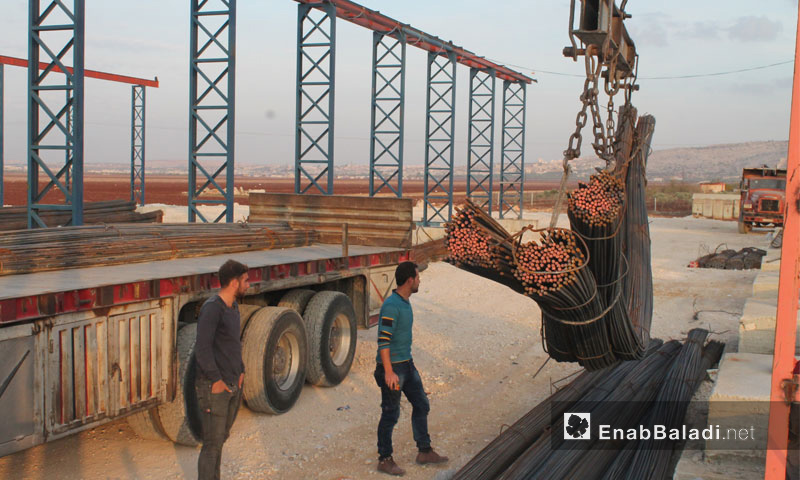Murad Abdul Jalil – Enab Baladi
As a result of the extensive construction activity witnessed in Idlib’s countryside in the past few months, sales of construction materials have increased between the Syrian opposition areas and Turkey via the city of Sarmada. Sarmada is considered the economic gateway for northern Syrian after the city gained prominence as an investment destination attracting traders in the area due to its important strategic position just six kilometers from the border with Turkey.
The trade in iron is currently considered one of the most active trading sectors, as countless cargo trucks and large quantities enter the area on a daily basis. This is due to the increasing demand for the product, especially in areas that are witnessing construction (Harem and Salqin) due to their proximity to the Turkish border and distance from armed conflict zones, in addition to the increase in the number of internally displaced persons coming in from other areas.
No Monopoly … Armed Factions Engage in the Iron Trade
The Bab al-Hawa border crossing is considered the only way for iron cargo trucks to enter Idlib when they come in from factories in Turkey following a deal with a Syrian trader, or when the iron arrives by boat from other countries to the city of Mersin and is transported over Turkish territory (transit) to the border crossing and then to the al-Tabon area (cargo unloading and weight identification zone).
After the trucks enter, they are unloaded in warehouses far from residential areas, according to Abdul Malik Abu al-Majd, an iron trader in Idlib. He confirmed that there are no companies that specialize in iron trading and no one monopolizes the market. Anyone can make a contract with Turkish iron companies and importers, and even some armed factions in the area are buying iron, storing it in warehouses and then selling it.
Enab Baladi contacted several sources in northern Syrian who confirmed that major factions have entered the iron trade within the “economic zone” belonging to each of them.
The source added that the factions control trade routes towards some areas outside their control, such as those under the control of the Democratic Syrian forces. These factions earn a fee ranging between 1000 and 2000 US dollars for each shipment, depending on its cargo.
Regarding the quantity of iron, Abu al-Majd said, “It cannot be counted because of the large quantities that enter every day as a result of the huge construction activity in the liberated areas.”
The Bab al-Hawa border crossing, managed by the Islamic Ahrar al-Sham Movement, does not officially declare the amount of trade activity taking place.
Prices in Dollars… Queuing Raises Prices
The traders in Idlib city price a ton of iron in US dollars since it is imported, which means that its price is affected by the global market. The price of a ton of iron is currently around 450 US dollars, including seven US dollars commission for the Bab al-Hawa border crossing for every ton that passes, in addition to the price of transport, loading and unloading the trucks.
The price of a ton may increase to more than 450 US dollars due to occasional traffic at the border crossing point. This forces trucks to wait several days, leading to the unavailability of iron in the area. According to Abu al-Majd, some “sick” traders use this as an opportunity to increase the price.
No Trade with Regime Areas
Smuggling between the regime and opposition areas has recently become widespread, operating via people who cooperate with both sides. However, the trade in iron is minimal when compared to other products, as iron requires large trucks to transport it.
Abdul Malik Abu al-Majd confirmed that there is no smuggling between the opposition and regime areas due to the presence of two checkpoints on the only two roads connecting the areas. The checkpoints belong to Fateh al-Sham Front, Ahrar al-Sham and Jund al-Aqsa, so there is no possibility of smuggling except by paying very high fees to both sides, according to Abu al-Majd.
An iron trader in Hama city (which is under regime control) who refused to disclose his name confirmed to Enab Baladi that smuggling the iron coming in from Turkey to the regime areas is impossible. The trader attributed this to the iron’s high price as a result of the taxes paid at the armed groups’ checkpoints in Idlib and the fees paid at the regime checkpoints in the area of Abu Dali in Hama’s northeastern countryside. The area is controlled by tribes supportive of the Syrian regime whose leader, Sheikh Ahmad Darwish, is a member of the People’s Council.
As a result, iron reaches the areas under regime control directly from Ukraine and Russia via Latakia port, which is cheaper than importing it from Turkey, bringing it into opposition-controlled Idlib and smuggling it to regime areas.
The price of a ton of iron in regime areas currently exceeds 550 US dollars, but this price is still lower than paying all the costs of transporting it from opposition areas, according to traders.
The trader in Hama confirmed that smuggling between the regime and opposition areas is limited to basic items, while Abdul Malik Abu al-Majd confirmed that trade with the regime areas is limited to scrap metal (aluminum, copper, cast iron and chrome).
In Idlib, the price of one kilogram of aluminum is 300 Syrian pounds and the price of one kilogram of copper is 1450 Syrian pounds while the price of one kilogram of cast iron is 650 Syrian pounds.
It appears the war has not stopped trade activities in northern Syrian; rather traders and those affected have adapted to the new market conditions to preserve their interests.

